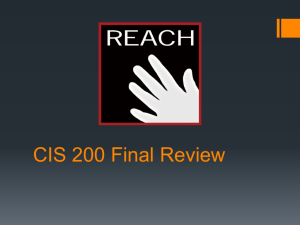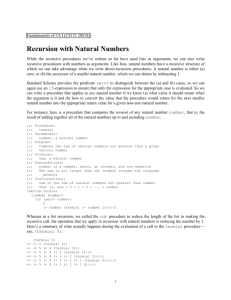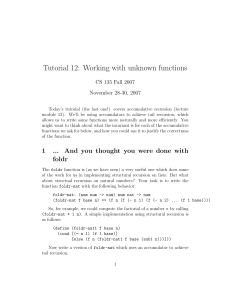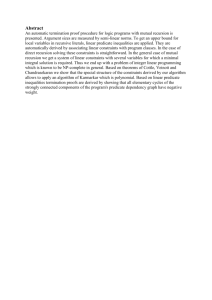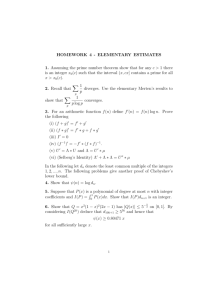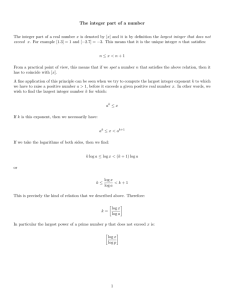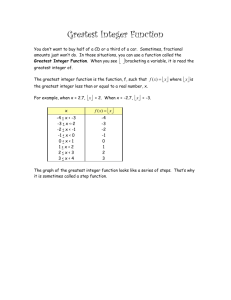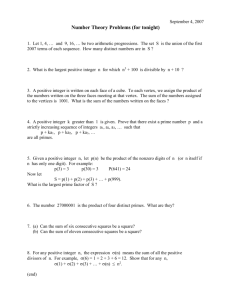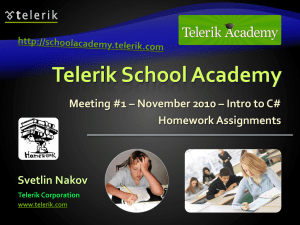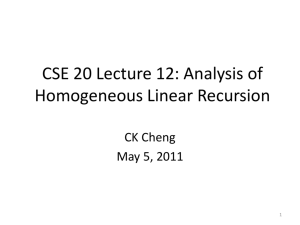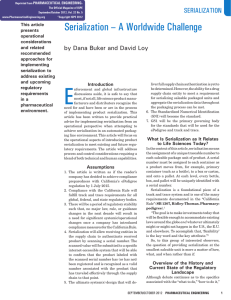CIS 200 Test Review 1
advertisement
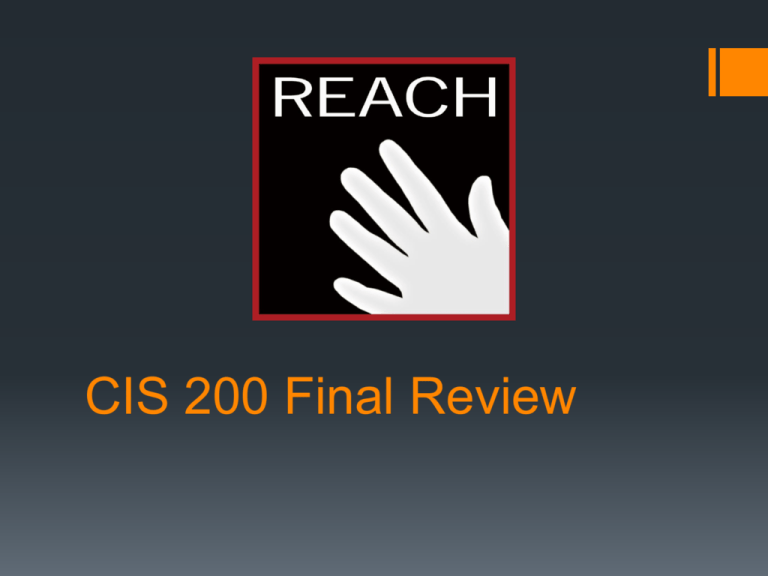
CIS 200 Final Review New Material Data Structures Linked List Doubly Linked List Doubly Linked List Doubly Linked List Queue Queue Stack Stack Test 01 Material Memory Management C, C++ - Have to “allocate” memory Forgetting to “free” results in memory leaks “Garbage Collector” Rounds up and “reclaims” memory Variables that drop out of “scope” will be collected Temporary values inside methods reclaimed on method exit Generally uncontrolled by the developer LINQ Language Integrated Query Perform Queries Against Objects, Data LINQ Keywords “from” - Data Source “where” – Filters the source elements with Boolean expressions “select” – Choosing the data type to work with “group” – Groups results according to a desired key value “orderby” – Sorts the query results in ascending or descending order based on a comparer “let” – Introduce a variable for query use Namespaces, Scope Classes, often with common functionality, bundled together System.Console System.Collections.Generic System.Linq Scope “private” – Can only be accessed by the class, object itself “protected” – Can only be accessed by the class, object, or any child classes, objects “public” – Available access for all Constructors C#, .NET compiler provides a ‘free’ constructor No parameters When a new constructor is created, ‘free’ constructor goes away Constructors can be “connected” with “this” Interfaces Object used for creating “interfaces”, common code Classes “include” an interface All methods, properties are “abstract” in an interface Objects that implement interface can be grouped List<IPayable> IPayable, IDisposable, etc Inheritance Classes with child or children classes Can be used to “share” common code properties Allows for “unique” objects, while reducing code Object -> Person -> Student Object -> Person -> Employee Inheritance Keywords “abstract” – Methods marked MUST be overridden Class declared with abstract prevents creation with “new” “virtual” – Methods marked CAN be overridden Controls “how” other classes inherit information from the class Private, protected, public – Used to control what is inheritance Casting Convert one type to another Integer to String Decimal to Integer Byte to Integer C#, .NET will know how to “box” and “unbox” types Decimal -> Object -> Integer Remember back to the Person – Student relationship We can “cast” Person to Student both ways Will cast to student just fine Will compile, But will throw an EXCEPTION at runtime Exceptions and Exception Handling Exceptions are… “Exceptional” events Unexpected events, errors during runtime Unhandled exceptions? Stack trace and application death Handled with try/catch/finally blocks Try block “attempts” to run the code in question Catch block handles the exception(s) that may occur Finally block, optional, always executes Test 02 Material Windows Forms, GUI Programming Elements Textboxes Tab Groups Checkboxes Fields Event Handlers Visual Studio Designer Event Handlers “Events” triggered by end user Button Press Key Press Field Entry …other GUI modifications or events Files and Streams Files Objects on Disks Streams Data structure that exposes Read Write Synchronous Asynchronous Write to File Read from File Recursion …a solution strategy that involves a simpler version of the same problem. The problem becomes simplified with each call until we reach a stopping point. Resolution level by level. Useful for Complex equations (Fibonacci number) Towers of Hanoi Binary Searching Entry point Stopping point Define a Recursion Method What is my base case? What is the solution to my base case? What is my intermediate case? What is the solution to the intermediate case? Recursion Example Recursion Example Big O What’s better? T(N) = 2 * N * N … 2(N^2) T(N) = 1 * N * N + 1 * N … N^2 + N Sample Questions from Blackboard Wiki What is the differences between Panel and GroupBox? Panel Scrollable Does not have a caption Groupbox Not scrollable Has a caption What is the differences between CheckBox and RadioButton? CheckBox Offer a “binary” choice Turn options on / off True / False Multiple together RadioButton Two or more mutually EXCLUSIVE items … XOR Multiple Choice Question RadioButton controls become a set of mutually exclusive choices. Why? A group of RadioButtons offer only a single choice to a user Selecting one will deselect another Logical XOR ListBox has four modes of operation, what are they and describe them. None No items can be selected One Only one item can be selected MultiSimple Multiple items can be selected MultiExtended Multiple items can be selected AND the user can use SHIFT, CTRL, and ARROw keys to make selections ComboBox has three modes of operation, name and describe each. Simple List is always visible, text portion editable User can enter a new value DropDown List is displayed by clicking down arrow and text portion is editable User can enter a new value DropDownList List is displayed by clicking down arrow and text is not editable Only values in the list can be selected How does the use of object serialization compare to simply writing our data to a text file? Raw Write to Text File List of “strings” Will require manual “reentry” later Some method, or handler to convert text file to .NET object Object Serialization Takes state of object, serializes for storage Reading serialization produces native .NET object The hierarchy of data includes what, and in what order? (Smallest) Bits Bytes Fields Records Files (Largest) Describe the hierarchy of data elements Bits 0 or 1 Bytes 8 bits together Fields Name, Phone number, Data Diemension Records Group of fields Files Group of fields or other data How can REACH further help you today? Ask Questions Now! Need to see an Example? Need to see a concept again? Need additional help? Visit us at: iTech Zone CRC (Ekstrom Library) Wednesday & Thursday (12 / 5 - 12 / 6) 9:00AM – 5:00PM Friday (12 / 7) 9:00AM – 4:00PM
